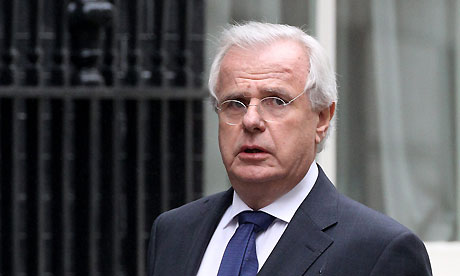Former Barclays chief executive Martin Taylor
Taylor told BBC Radio 4's Today programme that the bank appeared to have engaged in "systematic dishonesty".
"It's hard to believe a policy that was so systematic wasn't known at the top or near the top of the bank … Someone at senior level would have known." He said Diamond "must have known all about the investigation".
"It is really a matter for the board to decided if Bob Diamond … whether he can be the person to turn the page on this or whether he's part of the problem.
"If he stays it surely has to be because the bank believes that he is the only person who can turn the bank around. If he can help clean out the stables then he should stay, but only the board can decide that."
Former City minister Lord Myners
Myners told the BBC that the people at the top should take responsibility for "a complete cultural failure".
"This is the most corrosive failure of moral behaviour I have seen in a major UK financial institution in my career," he said.
"I think fines and public criticism will not stop these behaviours. These behaviours will not stop until the people perpetrating it or responsible for overseeing them face the prospect of criminal charges and the prospect of going to jail."
Former Liberal Democrat Treasury spokesman Lord Oakeshott
"If Bob Diamond had a scintilla of shame he would resign. If Barclays' board had an inch of backbone between them they would sack him."
Andrew Tyrie, chairman of the Commons Treasury committee
Tyrie said the committee would summon Diamond to account for what had happened.
"Banks were clearly acting in concert. I fear it's not going to be the end of the story, that we are going to find that other banks have been involved," he said.
Treasury committee member Pat McFadden
McFadden told BBC Breakfast: "You really have to wonder. Bob Diamond says this was counter to the values of the bank – you've got to wonder what the values really are in the bank, if this was the behaviour at quite senior levels of its investment banking division.
"The board of Barclays, if they are sitting this morning, thinking: 'We've paid the fine, we've co-operated with the inquiry, that's the end of it', I think that would be a real mistake. I don't think they should underestimate the damage this has done to their reputation and probably to banking more generally."
John Mann, a Labour MP and member of the Treasury committee
Mann called for Diamond and the RBS chief executive, Stephen Hester, to be "de-bonused" by taking away the biggest bonus they received over the last three years from their pay.
"Bank bosses have been happy to justify their huge bonuses, claiming it is needed to reward success.
"As we have a meltdown in RBS consumer services and the equivalent of fraud in fiddling interest rates at Barclays, the abject failure of both of these bankers needs to be recognised in their annual pay."
Chris Leslie, Labour shadow financial secretary to the Treasury
"These are serious instances of market abuse and it is vital that Treasury ministers now review the regulation of Libor arrangements.
"Mortgage repayments of ordinary householders up and down the country depend on a fair and true interest rate market mechanism."
Bart Chilton at the US Commodity Futures Trading Commission
"It's good news that we caught these guys … But we've got to continue to watch these markets for those that want to keep us unfunded and not have these new regulations in place – this is a cold slap in the face that says we've got to keep on the job."
Jacob Frenkel, a partner at Shulman Rogers in Potomac, Maryland
"I don't think there is any question that the industry's total cost when you throw in class actions, regulatory settlements, going-forward compliance and even the professional fees associated with the defence of these matters, will be well into the tens of billions of dollars."
• This article was amended on 3 July 2012. The original referred to the "former Barclays chairman Sir Martin Taylor". He is a former chief executive and does not have a knighthood.








